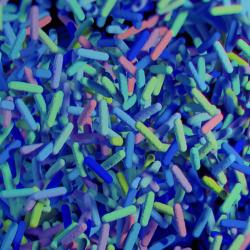
Thomas J. Sharpton
Thomas J. Sharpton
Research
Dr. Thomas Sharpton’s research is broadly directed towards ascertaining how the commensal gut microbiome mediates human health. Motivated by the global chronic disease epidemic, Dr. Sharpton seeks to determine if recent changes in human lifestyle and exposure have disrupted the gut microbiome’s contribution to physiology. To address the complexity of this problem, his research team develops and employs high-throughput systems biology tools – including computational, experimental, and analytical methods – that rapidly disentangle the mechanisms through which the gut microbiome links to and drives health. These efforts include the development of computational and data resources for the analysis of metagenomes, statistical approaches to model microbiome data, and experimental techniques in in vitro and in vivo model systems, especially zebrafish. His research also frequently applies evolutionary considerations to the analysis of gut microbiome data, following the hypothesis that chronic disease emerges in part because human physiology has evolved to depend upon essential microbiome functions that modern lifestyle disrupts. His laboratory collaborates broadly to address these questions and has explored a variety of disease considerations, ranging from inflammatory bowel disease in adults to childhood mental health.
Research Interests
- Metagenomics
- Gut microbiome
- Chronic disease
- Toxicology
- Nutrition
- Systems biology
- Biostatics
- Bioinformatics
- Machine learning
Education
Ph.D., University of California, Berkeley
B.A. Oregon State University, 2003
Publications
- Armour, C.R., Nayfach, S., Pollard, K.S. and Sharpton, T.J. 2019 A Metagenomic Meta-Analysis Reveals Functional Signatures of Health and Disease in the Human Gut Microbiome. mSystems, 4 (4) DOI: 10.1128/mSystems.00332-18
- Morelan, I.A., Gaulke, C.K., Sharpton, T.J., Thurber, R. Vega, and Denver, D.R. 2019. Microbiome variation in an intertidal sea anemone across latitudes and symbiotic states. Frontiers in Mar. Sci. 6:7.
- Flannery, J. Callaghan, B., Sharpton, T., Fisher, P., and Pfeifer, J. 2019. Is adolescence the missing developmental link in Microbiome-Gut-Brain axis communication? Dev. Psychobiol. PMID: 30690712.
- Kirchoff, N.S., Udell, M.A.R., and Sharpton, T.J. 2019. The gut microbiome correlates with conspecific aggression in a small population of rescued dogs (Canis familiaris). PeerJ. PMID: 30643689.
- Gaulke, C.A., Martins, M.L., Watral, V.G., Humphreys, I.R., Spagnoli, S.T., Kent, M.L., and Sharpton, T.J. 2019. A longitudinal assessment of host-microbe-parasite interactions resolves the zebrafish gut microbiome's link to Pseudocapillaria tomentosa infection and pathology. Microbiome. PMID 30678738.
- Gaulke, C.A., Rolshoven, J., Wong, C.P., Hudson, L.G., Ho, E., and Sharpton, T.J. 2018. Marginal zinc deficiency and environmentally relevant concentrations of arsenic elicit combined effects on the gut microbiome. mSphere. 3(6):pii:e00521.
- Gaulke, C.A. and Sharpton, T.J. 2018. The influence of ethnicity and geography on human gut microbiome composition. Nat. Med. 24(10):1495-1496.
- Kent, M.L., Gaulke, G.A., Watral, V., and Sharpton, T.J. 2018. Pseudocapillaria tomentosa in laboratory zebrafish (Danio rerio): Patterns of infection and dose response. Dis. Aquat. Org. (in press).
- Wang, L., Shantz, A.A., Payet, J., Sharpton, T.J., Foster, A., Burkepile, D.E., and Vega-Thurber, R. 2018. Corals and their microbiomes are differentially affected by exposure to elevated nutrients and a natural thermal anomaly. Frontiers of Mar. Sci. 5:101.
- Allan, E.R.O., Tennessen, J.A., Sharpton, T.J. and Blouin, M.S. 2018. Allelic variation in a single genomic region alters the microbiome of the snail Biomphalaria glabrata. J. Hered. Mar 16. PMID 29566237.



